<> Zeltus amasa (Hewitson, [1865]) <>
the Fluffy Tit ผีเสื้อหางพลิ้ว
Click on any photo to see all photos full size in Lightbox
Additions and corrections to the information provided on this page is always welcome. Please use the Contact form.
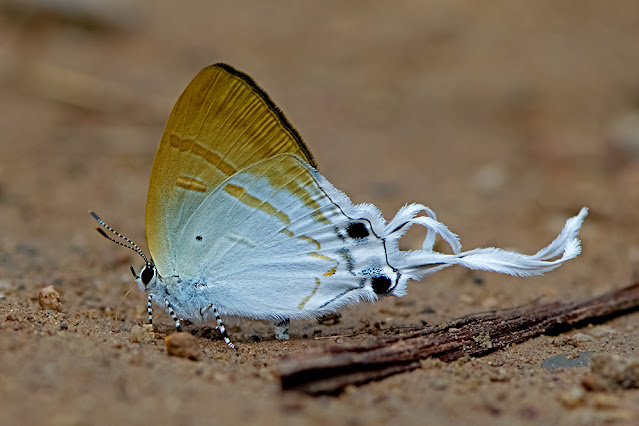
Photo taken at Chiang Dao Wildlife Sanctuary, Chiang Mai, Thailand. 540m a.s.l.

There is a difference of opinion about the genus of this species and so until this is resolved I am publishing this page under each genus (Hypolycaena and Zeltus) separately.
Zeltus amasa is an amazing little butterfly. To see it flying with its tails twirling around behind it is a beautiful sight. The species is widely distributed throughout the region but is not common everywhere. It is very small and were it not for the long white tails it could be easily overlooked. There are 2 pairs of tails on the hindwing, one pair at the end of vein 1b and one pair at vein 2. Both pairs are long but the ones at 1b are about twice as long as the ones at vein 2. Although the sexes are similar in appearance on the underside the upper wings are quite different, the female being brown and the male being blue and white. Both sexes occasionally bask on low vegetation but the males are seen most often. Males are frequently seen puddling at the side of streams or at damp patches.
The species is multivoltine and with a relatively short life cycle there are several generations each year. The adult female lays her eggs singly on a flower bud, stalk, or petal of the host plant. After hatching the larvae feed mainly on the flowers and pedicles before moving to a nearby leaf to pupate. The pupa is initially green and blends in well with the colour of the leaf but darkens shortly before emergence.
Synonyms and previously used names: Papilio etolus, Hypolycaena amasa, Zeltus etolus, Hypolycaena etolus
Taxonomy: Animalia - Arthropoda - Insecta - Lepidoptera - Lycaenidae - Theclinae - Zeltus - amasa
Regional subspecies: Zeltus amasa amasa (India, Myanmar, N.Thailand, Laos, Cambodia, Vietnam, S.China), Z.amasa maximinianus (S.Thailand, Malaysia, Singapore, Indonesia), Z.amasa miyatakei (Palawan-Philippines). The following subspecies are listed on various islands in Indonesia but it is unclear if they are valid or not - censorinus, gratidianus, pompaedius.
Regional Distribution: Nepal. Bhutan, India, Myanmar, Thailand, Laos, Cambodia, Vietnam, China, Malaysia, Singapore, Indonesia, Philippines
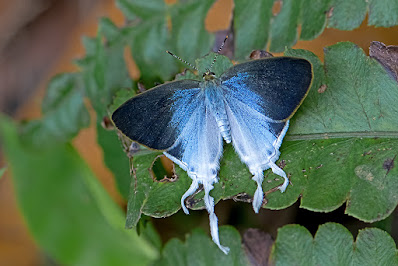 |
| Lamnamkok National Park, Chiang Rai, Thailand ♂ 450m a.s.l. |
Habitat: Zeltus amasa is found in lowland rainforest, secondary forest, and montane forest. It likes the brighter open areas within the forest and also the edges or near streams. Although usually encountered at lower elevations it has been recorded up to more than 2000m a.s.l.
Flight time: all year, depending on location Wingspan: 24-28mm
Life History: egg 3 days instar 1 2-3 days instar 2 2 days instar 3 2-3 days instar 4 2-4 days instar 5 n/a pupa 7-8 days Total egg to adult 19-23 days
All times are approximate and can vary depending on the season and on the host used.
Larval Hosts: Pterospermum acerifolium, Pterospermum diversifolium (Malvaceae), Clerodendrum cyrtophyllum, Clerodendrum laevifolium (Lamiaceae).
Actual host plant used depends upon location and availabilty of plant species. There may be other hosts that have not yet been recorded.
Adult Food Sources: Nectar - this butterfly is not known to visit flowers for nectar. Other - mud puddling, bird droppings, carrion.
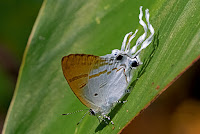 |
| Chiang Dao Wildlife Sanctuary, Chiang Mai, Thailand |
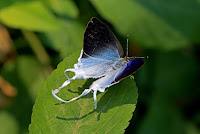 |
| Doi Suthep-Pui National Park, Chiang Mai, Thailand ♂ |
 |
| Chiang Dao Wildlife Sanctuary, Chiang Mai, Thailand ♀ |
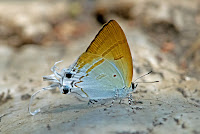 |
| Doi Suthep-Pui National Park, Chiang Mai, Thailand |
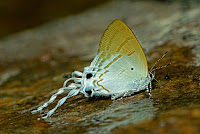 |
| Doi Suthep-Pui National Park, Chiang Mai, Thailand |
 |
| Doi Suthep-Pui National Park, Chiang Mai, Thailand |
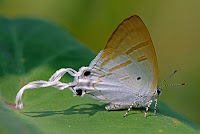 |
| Doi Suthep-Pui National Park, Chiang Mai, Thailand |
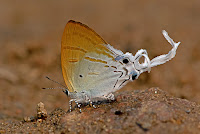 |
| Lamnamkok National Park, Chiang Rai, Thailand |
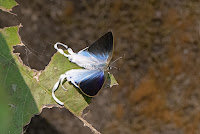 |
| Lamnamkok National Park, Chiang Rai, Thailand ♂ |
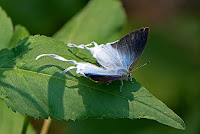 |
| Doi Suthep-Pui National Park, Chiang Mai, Thailand ♂ |
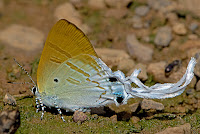 |
| Chiang Dao Wildlife Sanctuary, Chiang Mai, Thailand |
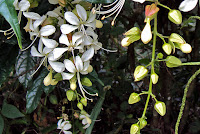 |
| Clerodendrum laevifolium, a larval host |
 |
| Pterospermum diversifolium, another larval host |
Links to other pages in this series for species in the same subfamily
